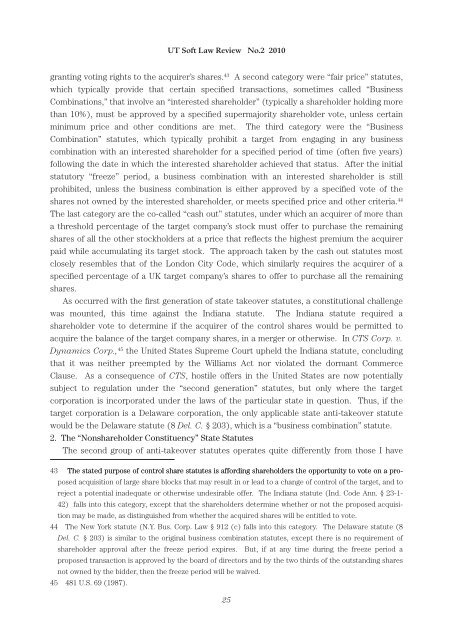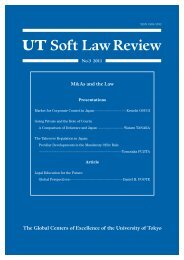UT Soft Law Review
UT Soft Law Review
UT Soft Law Review
You also want an ePaper? Increase the reach of your titles
YUMPU automatically turns print PDFs into web optimized ePapers that Google loves.
<strong>UT</strong> <strong>Soft</strong> <strong>Law</strong> <strong>Review</strong> No.2 2010granting voting rights to the acquirer’s shares. 43 A second category were “fair price” statutes,which typically provide that certain specified transactions, sometimes called “BusinessCombinations,” that involve an “interested shareholder” (typically a shareholder holding morethan 10%), must be approved by a specified supermajority shareholder vote, unless certainminimum price and other conditions are met. The third category were the “BusinessCombination” statutes, which typically prohibit a target from engaging in any businesscombination with an interested shareholder for a specified period of time (often five years)following the date in which the interested shareholder achieved that status. After the initialstatutory “freeze” period, a business combination with an interested shareholder is stillprohibited, unless the business combination is either approved by a specified vote of theshares not owned by the interested shareholder, or meets specified price and other criteria. 44The last category are the co-called “cash out” statutes, under which an acquirer of more thana threshold percentage of the target company’s stock must offer to purchase the remainingshares of all the other stockholders at a price that reflects the highest premium the acquirerpaid while accumulating its target stock. The approach taken by the cash out statutes mostclosely resembles that of the London City Code, which similarly requires the acquirer of aspecified percentage of a UK target company’s shares to offer to purchase all the remainingshares.As occurred with the first generation of state takeover statutes, a constitutional challengewas mounted, this time against the Indiana statute. The Indiana statute required ashareholder vote to determine if the acquirer of the control shares would be permitted toacquire the balance of the target company shares, in a merger or otherwise. In CTS Corp. v.Dynamics Corp., 45 the United States Supreme Court upheld the Indiana statute, concludingthat it was neither preempted by the Williams Act nor violated the dormant CommerceClause. As a consequence of CTS, hostile offers in the United States are now potentiallysubject to regulation under the “second generation” statutes, but only where the targetcorporation is incorporated under the laws of the particular state in question. Thus, if thetarget corporation is a Delaware corporation, the only applicable state anti-takeover statutewould be the Delaware statute (8 Del. C. § 203), which is a “business combination” statute.2. The “Nonshareholder Constituency” State StatutesThe second group of anti-takeover statutes operates quite differently from those I have43 The stated purpose of control share statutes is affording shareholders the opportunity to vote on a proposedacquisition of large share blocks that may result in or lead to a change of control of the target, and toreject a potential inadequate or otherwise undesirable offer. The Indiana statute (Ind. Code Ann. § 23-1-42) falls into this category, except that the shareholders determine whether or not the proposed acquisitionmay be made, as distinguished from whether the acquired shares will be entitled to vote.44 The New York statute (N.Y. Bus. Corp. <strong>Law</strong> § 912 (c) falls into this category. The Delaware statute (8Del. C. § 203) is similar to the original business combination statutes, except there is no requirement ofshareholder approval after the freeze period expires. But, if at any time during the freeze period aproposed transaction is approved by the board of directors and by the two thirds of the outstanding sharesnot owned by the bidder, then the freeze period will be waived.45 481 U.S. 69 (1987).25





